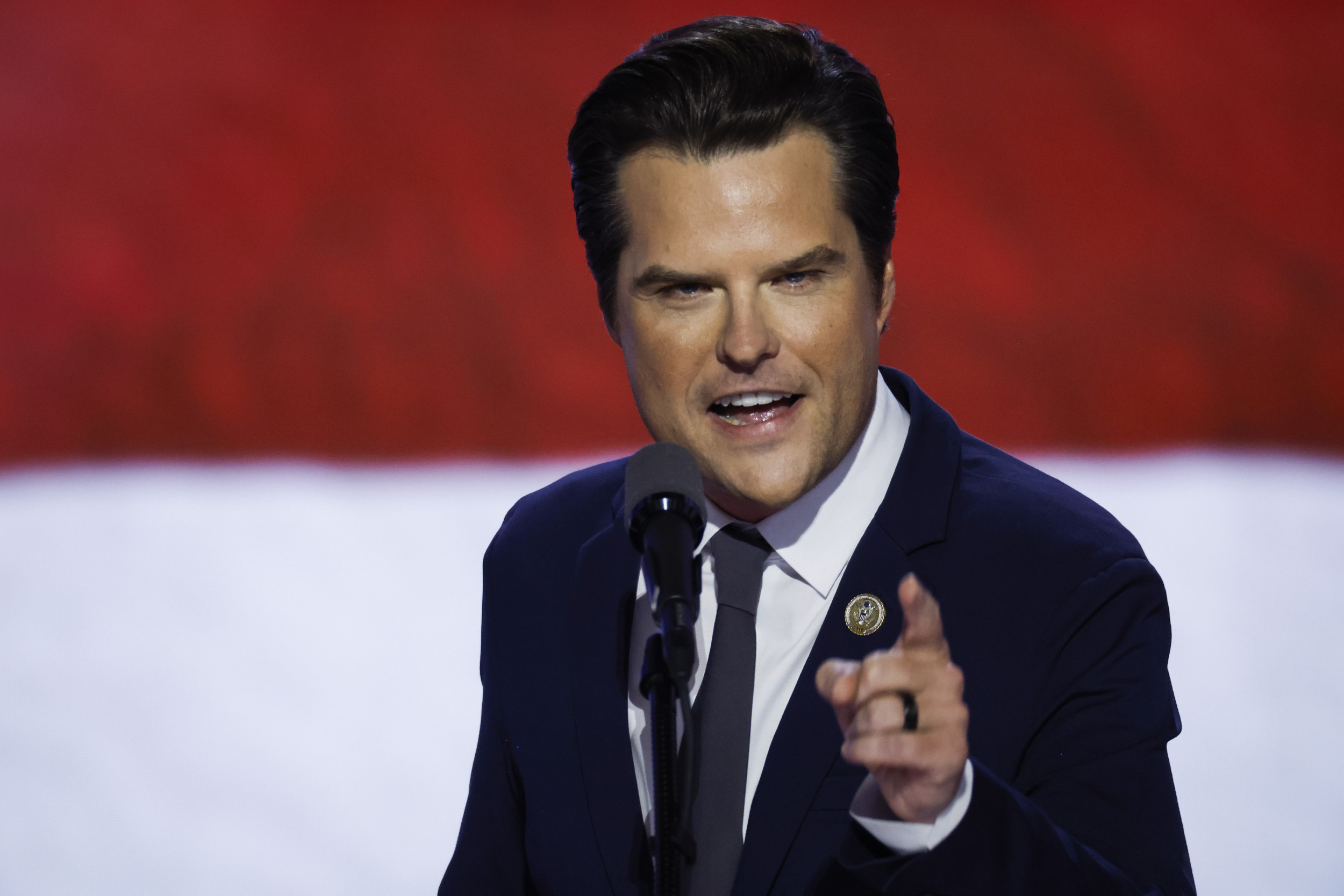Republican senators up for reelection in 2026 may need to walk a fine line amid the battle to confirm President-elect Donald Trump's Cabinet nominees.
Trump, who this month defeated Vice President Kamala Harris in the presidential election, has announced several of his Cabinet picks, leaning toward people who have been staunch loyalists.
Among the picks to spark the most criticism are former Representative Matt Gaetz as attorney general, Fox News host Pete Hegseth as defense secretary and Robert F. Kennedy Jr. as health and human services secretary. Although Republicans have won a majority of Senate seats, there are already questions about whether all of the nominees will garner enough votes to get confirmed.
Democrats, and some Republicans, have raised concerns about whether Gaetz, Hegseth or Kennedy have the experience necessary for those positions, as well as parts of their record. Gaetz has faced questions about a House Ethics Committee probe into allegations that he was part of a scheme that led to the sex trafficking of a 17-year-old girl. Gaetz maintains his innocence and has not been charged.

Hegseth's opposition to women in combat and Kennedy's comments about the ineffectiveness and dangers of vaccines and have also drawn criticism.
The nominations may in particular pose a test for GOP senators running for reelection in competitive races in 2026, when Democrats are hoping for a 2018-style "blue wave," as a president's party typically loses ground in Congress during the midterms.
Senators Susan Collins of Maine, which backed Harris, and Thom Tillis of North Carolina, which voted for Trump by about 3 percentage points, are expected to be on the frontlines of Republicans' efforts to defend their Senate majority in two years.
They will need to strike a balance between maintaining an independent image to court moderate voters while not drawing the ire of Trump and his supporters to avoid a contentious primary challenge from the right.
Costas Panagopoulos, professor of political science at Northeastern University, told Newsweek that Republican senators up for reelection will be walking a "fine line" in their support for Trump and not alienating voters in their constituencies.
They could oppose some Trump nominees to show voters they're not "rubber stamps" for his agenda. That could help them "score points with voters for exercising some independent judgment."
"There's always a chance it could backfire, but there's also a chance it could help them with voters who care about ensuring that Congress acts as a check on presidential power, Panagopoulos said.
If they vote to confirm some of the most controversial picks like Gaetz, Democrats will have fuel for the midterms "very early on in the Trump administration with ample time to mount a campaign against them," he said.
But if they defy Trump, they run the risk of him weighing in on their 2026 races, particularly if they end up with a more right-leaning primary challenger.
"It's very likely that we'll see Trump weighing in, in part because I think he perceives himself as a kingmaker in some respects, and also that his supporters are looking for those kinds of signals from him," he said. "He won't be able to resist weighing in on races across the country, and the only question is whether he'll be effective in those efforts."
Trump's endorsement has been make-or-break for some Republican candidates who have broken with him over the past few years. Trump opposed Representative Liz Cheney in her 2022 reelection in Wyoming, helping to secure her primary loss to his preferred candidate, now-Representative Harriet Hageman.
Cheney was among the 10 House Republicans who voted to impeach Trump following the January 6, 2021, riot at the U.S. Capitol to protest the 2020 election results. She served on the House select committee investigating Trump's actions after the election and emerged as one of his most vocal critics in the Republican Party.
Incumbent senators like Collins and Tillis have high name recognition, connections to donors and strong bases in their states and may be more difficult to unseat in a primary, Panagopoulos said.
Robert Y. Shapiro, a professor of political science at Columbia University, told Newsweek that any conservative primaries to vulnerable Republican senators would be risky for Trump.
"The primary challenge could very well fail or produce yet another bad MAGA candidate who will lose to a good Democrat in these states which have strong Democratic bases," he said.
These senators can navigate this challenge "in a concerted way," Shapiro said.
"First, they can raise issues with each of the picks and see if other Republicans raise issues. They can then see where the vote stands. They will need others to vote against the appointment to make this work. If their votes will not affect the outcome, they can just not vote against them," he said.
If they are the deciding votes, on the other hand, they could "take a principled stand" and "would have good reason to reject bad candidates and they can explain to this to voters," Shapiro said, noting that not all Republicans are "lock-step MAGA voters."
Ashley Moraguez, professor and co-chair of political science at the University of North Carolina Asheville, told Newsweek that Tillis "will have to be very strategic in how he casts his votes moving forward, especially on highly visible issues including nominations to the Cabinet.
"He will need to find the right balance, if it exists, between staving off a primary challenge from the right and moderate general election challenge from the left. It won't be easy."
There are elements of the GOP base that have "not always supported" Tillis, but moderate and unaffiliated voters are likely to be "pivotal" in the midterms, Moraguez said.
How he votes on these nominees "will be the first real test of how he is going to navigate the murky waters he finds himself in" and likely vote against "some of the more controversial picks" while voting in favor of the majority of Trump's nominees, Moraguez said.
North Carolina's Senate race will be among the most competitive in 2026, she said, noting that it is a "divided state with a large number of unaffiliated voters and, just this year, we've seen statewide races go to both Republican and Democratic candidates.
Newsweek reached out to the Collins and Tillis campaigns for comment via email.
Senators have already expressed some skepticism at some of Trump's picks.
Collins, who last week said she intends to run for reelection, told reporters she was "shocked" that he is nominating Gaetz to lead the Department of Justice.
"This is why the Senate's advise and consent process is so important," she said. "I'm sure that there will be many, many questions raised at Mr. Gaetz's hearing."
Tillis told reporters that he believes Gaetz will face a challenge in getting confirmed.
"I'm all about counting votes, and I would think that he's probably got some work cut out for him," he said. "We're not going to get a single Democrat."
Both senators last won reelection in 2020. Collins defeated Democrat Sara Gideon with 51 percent of the vote. Tillis defeated Democrat Call Cunningham with 48.7 percent of the vote, less than a 2-point margin.
There may be other GOP senators in tough races in 2026—Democrats will likely target John Cornyn of Texas and Joni Ernst of Iowa—but those states backed Trump by double digits this year. An open seat in Ohio to replace Vice President-elect JD Vance could also be competitive.
Collins and Tillis haven't shied away from criticizing Trump. Collins voted in favor of convicting Trump during his second impeachment trial. Tillis did not but was critical of him after the trial, saying that his "words and actions were reckless and he shares responsibility for the disgrace that occurred on January 6."
Both voted to acquit Trump after his first impeachment.
During Trump's first term, Collins voted against Secretary of Education Betsy DeVos during her confirmation hearing, as well as against the confirmation of U.S. Supreme Court Justice Amy Coney Barrett because of the proximity to the 2020 presidential race.
















)



 English (US) ·
English (US) ·